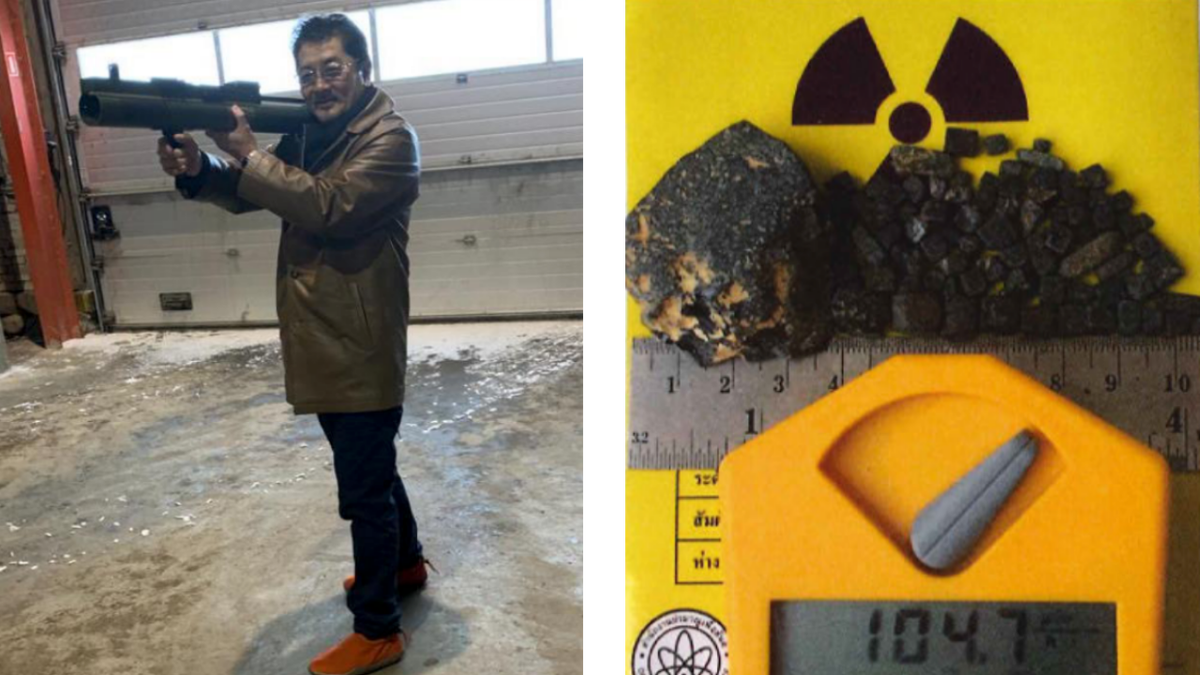
Takeshi Ebisawa, a purported leader in Japan’s Yakuza crime syndicate, was charged on Wednesday with trying to sell undercover DEA agents nuclear materials that he believed would eventually make their way to Iran. Why was it the DEA who nabbed Ebisawa? The Yakuza leader first tried to sell them drugs and surface-to-air missiles.
The news comes from the United States Attorney for the Southern District of New York, who alleges Ebisawa started sending photos of “rocky substances” along with Geiger counters that measure radiation to undercover officers in 2020. The 60-year-old Ebisawa even showed samples of nuclear materials to an agent who was posing as a major weapons and drugs trafficker in Thailand, according to U.S. prosecutors.
Advertisement
Undercover agents made Ebisawa believe they were acting as middlemen for an Iranian general for use in a nuclear weapons program. Iran has long been working on nuclear weapons, though the program was briefly halted in 2015 and 2016 thanks to negotiations by former President Barack Obama. But Trump dropped out of the international agreement in 2018, allowing Iran to continue development of nuclear weapons.
Advertisement
Ebisawa was first arrested in New York in April 2022 and charged with trying to purchase surface-to-air missiles in exchange for heroin. Ebisawa is being charged alongside a co-defendant, identified by U.S. authorities as 61-year-old Somphop Singhasiri from Thailand, who also faces drug charges.
Advertisement
Prosecutors allege Ebisawa set up a videoconference with undercover agents on February 4, 2022, who explained he had “more than 2,000 kilograms of Thorium-232″ and “more than 100 kilograms of uranium” in the form of U3O8. The compound U3O8 is commonly known as “yellowcake,” which is a name familiar to anyone who lived through the lead-up to the Iraq War in 2003. Iraqi leader Saddam Hussein was supposedly trying to buy yellowcake from Niger for his own nuclear weapons development program, a claim that later turned out to be based on forged documents.
The superseding indictment filed on Wednesday explains that police in Thailand helped U.S. authorities seize the nuclear materials, including uranium and weapons-grade plutonium, which they say could have been used to build nuclear weapons. The nuclear materials that Ebisawa tried to sell were allegedly sourced from Burma, also known as Myanmar.
Advertisement
“As alleged, the defendants in this case trafficked in drugs, weapons, and nuclear material—going so far as to offer uranium and weapons-grade plutonium fully expecting that Iran would use it for nuclear weapons. This is an extraordinary example of the depravity of drug traffickers who operate with total disregard for human life,” DEA Administrator Anne Milgram said in a public statement posted online.
“I commend the men and women of DEA and this prosecution team for their tireless work to protect us from such evil,” Milgram continued.
Advertisement
The DEA has been investigating Ebisawa over his alleged drug trafficking since at least 2019. But Wednesday’s announcement that he was allegedly trying to sell materials that would help Iran manufacture a nuclear weapon certainly ups the stakes.
Ebisawa is scheduled to appear before U.S. District Judge Colleen McMahon at noon ET on Thursday. The alleged Yakuza leader faces seven counts, including the international trafficking of nuclear materials, narcotics importation, and money laundering. Ebisawa also faces a charge of conspiracy to possess firearms, including machine guns and destructive devices, which carries the potential sentence of life in prison.
Services Marketplace – Listings, Bookings & Reviews